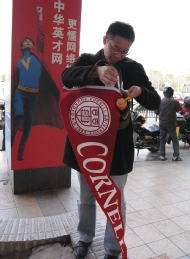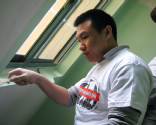How International Alumni Contribute to Cornell
By Chuck Schilke, JD '88
As the number of international students at Cornell grows, and as American students opt for careers in other countries, the community of Big Red alumni abroad increases at the same pace. With Cornell's internationalization from Ithaca to Doha as land-grant university to the world, our students, faculty, and alumni abroad are playing a more important role for the University—and for projecting a positive Big Red image abroad.

Fully involving international graduates in Cornell alumni affairs offers special opportunities and challenges. While a Cornell degree is valuable anywhere in the world, beyond Cayuga's waters the cohesion of the alumni body may diminish. Creative efforts both by alumni abroad and domestic volunteers are needed to maximize Cornell's global impact and improve alumni solidarity outside the United States. Those efforts benefit foreign and domestic alumni alike.
In what ways do international alumni volunteer for Cornell? Like U.S. alums, they provide information to prospective applicants and interview them through CAAAN, organize guest speakers and other events, help alumni with career issues, perform community service, and generally promote the University.
But Cornellians abroad make some distinctive contributions to promoting alumni unity. For example, Noel Elman '99, ME '00, of the Cornell Club of Israel writes that they have organized a Cornell Israel Google group and are in the process of creating a Face-book group for young Israeli alumni. Similarly, Raenna Cran-bourne '98 of the Cornell Club of the Philippines notes that alumni organize Zinck's Night in the Philippines every year. Like many other international alumni clubs, the Philippines club has an annual anniversary party to commemorate its founding. And drawing upon their experience with the Cornell Club of Northern California, Monica Huang, MS '03, and Samuel Chen, ME '02, of the Cornell Club of Shanghai created the first international Cornell Cares Day; they have also helped to organize visits by Presidents Emeriti Rhodes and Rawlings and President Skorton.
Moreover, alumni abroad also make striking contributions to international understanding. Elman writes that Big Red alumni in Israel help Cornell students, faculty, and alumni in the United States and elsewhere find information about Israel—and even connect with those at Cornell who wish to visit. Elman makes a personal effort to link Cornell faculty members to colleagues in Israel. He's introduced Engineering college faculty to a research group at Tel Aviv University's Engineering and Exact Sciences School. Alumni in Shanghai also connect Cornell faculty and others to high schools, universities, companies, and research centers.
Cranbourne notes that the limited scholarship opportunities for international students greatly concern alumni abroad. To address this issue, she led the Cornell Hotel Society's Philippines Chapter in organizing the CHS Asia Pacific meeting last year, a four-day conference on Boracay, an island south of Manila, that raised funds for a scholarship to the Hotel school. Huang and Chen note, however, that setting up a nonprofit in the United States is easier than in Shanghai.

Reciprocally, Big Red alumni abroad also draw upon American alumni as sources of support. Cranbourne notes that her club has asked Filipino alums living in the United States to support the club's Habitat for Humanity work in the Philippines.
International alumni agree that travel should play a greater role in sustaining relationships between them and their U.S.-based classmates. Elman suggests Israeli alums take annual trips to Ithaca to inform those at the University about current events in Israel. In the opposite direction, Cranbourne suggests that Cornell alumni from the United States and elsewhere organize "voluntourism," in which alumni visit a country such as the Philippines and perform community service and out-reach, particularly collaborative projects that bring together students and alumni. Similarly, Shanghai alumni are eager to host forums to showcase Cornell and to collaborate with the University in hosting international events that recognize foreign and expatriate alumni.
Elman emphasizes that he is particularly interested in promoting Cornell because of its unique vision for comprehensive and global education. "My experience at Cornell as an undergraduate and graduate student helped me to cultivate and foster my ideas about promoting this global mission," he says. The University and its alumni volunteers abroad are increasingly enhancing that vision.
Chuck Schilke, JD '88, is a former director of the Mid-Atlantic Region of the Cornell Alumni Federation. He is the associate dean of the Real Estate Program at Georgetown University.


